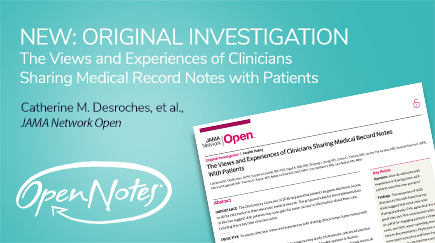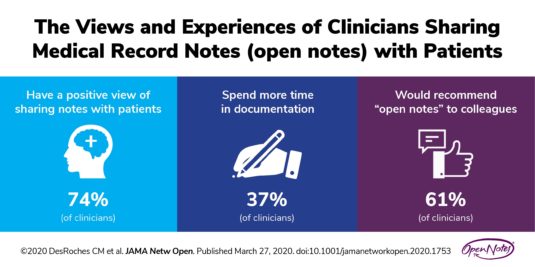
Survey reveals clinicians support sharing notes with patients
Most clinicians reported few drawbacks from this change in longstanding practice
Boston, MA – A first of its kind study of the views and experiences of clinicians who have shared their notes with patients over an extended period of time was published today in the Journal of the American Medical Association (JAMA) Network Open. Of the 1,628 doctors, advanced practice nurses, registered nurses and others surveyed, most reported positive experiences with this new effort to offer more transparent communication, although some reported spending increased time documenting clinical visits. The full open access article is online now.
The researchers conducted a web-based survey of primary care physicians, specialist physicians, advanced practice nurses, physician assistants, therapists and others in outpatient settings at Beth Israel Deaconess Medical Center in Boston, University of Washington Medicine in Seattle and Geisinger Health in Pennsylvania. Invitations were sent to 6,064 clinicians, and 1,628 responded to the survey. Participants were clinicians who had written at least one note that was opened by a patient in the year prior to the survey, which was administered from May 21, 2018 to August 31, 2018.
Of the 1,628 survey responses, 74 percent held positive views about note sharing. Thirty-seven percent of physician respondents reported spending more time in documentation, but most found the practice did not affect their workflow and would recommend it to colleagues at other institutions. Doctors with more years in practice and fewer hours spent in patient care were the most positive about open notes. Even among a subgroup of clinicians who were less enthusiastic, a majority endorsed the idea of sharing notes and believed the practice could be helpful for engaging patients more actively in their care.

“Many studies find that patients report important benefits from reading clinical notes,” said Catherine M. DesRoches, DrPH, Associate Professor of Medicine at Beth Israel Deaconess Medical Center and Harvard Medical School, and lead author of the study. “However, this practice is relatively new, and we wanted to understand the long-term impact on doctors and other clinicians. Our findings that most clinicians are positive about sharing notes should be reassuring to healthcare organizations as they work to offer greater transparency to their patients.”
Doctors reported changing the way they composed their notes, including both how they document sensitive information and guard against language that might be perceived as critical of patients. Female doctors were more likely than males to report making changes to their notes and spending more time in documentation.
This study may help clinicians prepare for rapidly evolving changes in practice. Passed by Congress in 2016, the 21st Century Cures Act requires patients be given electronic access to virtually all the information in their electronic medical records. Final rules designed to implement the 21st Century Cures Act include a provision requiring that patients can electronically access all of their electronic health information at no cost, including the notes their clinicians write.
“We’ve learned over the past 10 years that truly transparent communication brings enormous clinical benefits to patients,” said Tom Delbanco, MD, the John F. Keane & Family Professor of Medicine at Beth Israel Deaconess Medical Center and Harvard Medical School, and co-founder of the international OpenNotes movement, and co-senior author of the study. “It helps them manage medications more effectively, and it builds trust and patient safety. We started small, but today 45 million patients in the U.S. have gained ready access to notes their doctors are writing.”
This work was supported by funding from the Robert Wood Johnson Foundation, the Cambia Health Foundation, the Gordon and Betty Moore Foundation, and the Peterson Center on Healthcare. Dr. Bell reported receiving grants from the Agency for Healthcare Research and Quality outside of the submitted work. Dr. Payne reported receiving grants from the Agency for Healthcare Research and Quality and Brotman Baty Institute outside of the submitted work.
Co-authors include Suzanne Leveille, RN, PhD, Sigall K. Bell, MD, Leonor Fernandez, MD, and Jan Walker, RN, MBA at Harvard Medical School; Zhiyong J. Dong, MS, Kendall Harcourt, MPA, and Patricia Fitzgerald, MS at Beth Israel Deaconess Medical Center; Joann G. Elmore, MD, MPH, at David Geffen School of Medicine and Fielding School of Public Health, University of California, Los Angeles; Thomas H. Payne, MD at University of Washington, UW Medicine, Seattle; and Rebecca Stametz, DeD, MPH at Steele Institute for Health Innovation, Geisinger, Danville, Pennsylvania.
About OpenNotes
OpenNotes, based at the Beth Israel Deaconess Medical Center in Boston, a major Harvard Medical School teaching hospital, studies the effects of shared clinical notes on patients, care partners and clinicians, and disseminates its findings. OpenNotes works with collaborators around the country and overseas to foster and evaluate the spread and implementation of shared clinical notes (“open notes”). OpenNotes does not develop software and is not a technology company. Funded entirely by philanthropy, OpenNotes has been supported generously by grants from the Robert Wood Johnson Foundation, Gordon and Betty Moore Foundation, Peterson Center on Healthcare, Cambia Health Foundation, Commonwealth Fund, John A. Hartford Foundation, New York State Health Foundation, and contributions from generous individuals. To learn more, visit www.opennotes.org.
About Beth Israel Deaconess Medical Center
Beth Israel Deaconess Medical Center is a patient care, teaching and research affiliate of Harvard Medical School and consistently ranks as a national leader among independent hospitals in National Institutes of Health funding.
BIDMC is in the community with Beth Israel Deaconess Hospital-Milton, Beth Israel Deaconess Hospital-Needham, Beth Israel Deaconess Hospital-Plymouth, Anna Jaques Hospital, Cambridge Health Alliance, Lawrence General Hospital, Signature Healthcare, Beth Israel Deaconess HealthCare, Community Care Alliance and Atrius Health. BIDMC is also clinically affiliated with the Joslin Diabetes Center and Hebrew Rehabilitation Center and is a research partner of Dana-Farber/Harvard Cancer Center and the Jackson Laboratory. BIDMC is the official hospital of the Boston Red Sox. For more information, visit www.bidmc.org.
BIDMC is part of Beth Israel Lahey Health, a new health care system that brings together academic medical centers and teaching hospitals, community and specialty hospitals, more than 4,000 physicians and 35,000 employees in a shared mission to expand access to great care and advance the science and practice of medicine through groundbreaking research and education.




You must be logged in to post a comment.